
September 29, 2009
“We are a society that is addicted to oil, and we don’t want to hear that it is going to run out.”
– James Howard Kunstler
What do the following three cities have in common? Maracaibo in Venezuela, McCamey in Texas, and Baku in Azerbaijan (formerly part of the Soviet Union)? They are all dead ghost towns, former oil production supercenters of their respective nations, and indeed the world. They are now littered with the deteriorating skeletons of oil towers and pumps that have long since ceased to nod their bowed heads in prayer to their subterranean god. Their landscapes, eerily silent and still, are reminiscent of World War I European battlefields – stripped of life and livelihood.

Baku, Azerbaijan
We worship oil – and while an impressive 70% of crude oil is refined into transportation energy, a whopping 98% of transportation energy comes from oil. And if all the predictions are correct, the impact on our economy and our civilization is such that any delay in our response is only going to magnify the coming cataclysm. Imagine an asteroid hitting the planet in slow motion.
Peak Oil Preparedness Task Force
When Supervisor Ross Mirkarimi commissioned a hearing on San Francisco’s Peak Oil Preparedness Task Force Report Thursday, members of the Peak Oil Preparedness Task Force discussed at length the effects of Peak Oil and Gas on the City and its implications on our way of life. The full impacts of the inexorable decline of global oil production are, as yet, unknown, but worst case estimates strongly suggest we will see seemingly never ending resource wars, increased political instability, economic collapse and social upheaval. And as demand for oil continues to outstrip supply, the shocking ripple effect of $5 a gallon for gas in 2008 will be remembered as the good old days.
Heading up the report was Task Force Chair Jeanne-Marie Rosenmeier, a Certified Public Accountant and member of the California Green Party. She opened her presentation illustrating what many of us may already know: that oil production forms a bell curve, and that there is an ever-widening gap between supply and demand in the world today.
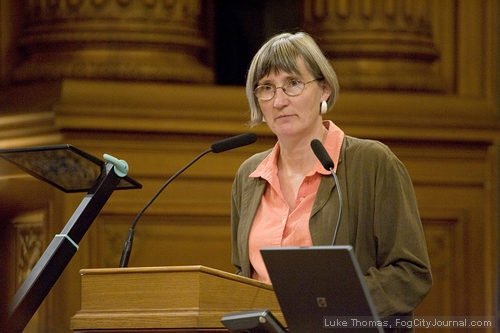
Peak Oil Task Force Chair Jeanne-Marie Rosenmeier.
In the 1955, Dr. M.K. Hubbert, then a respected scientist, was roundly ridiculed after suggesting US oil production would peak in the early 1970s and global oil production would peak in the 1990s. It took almost two-decades for his predictions to be accepted, but by then the damage had already been done. Hubbert’s Peak, as it has now come to be known, is now widely accepted by even the most optimistic of oil speculators.
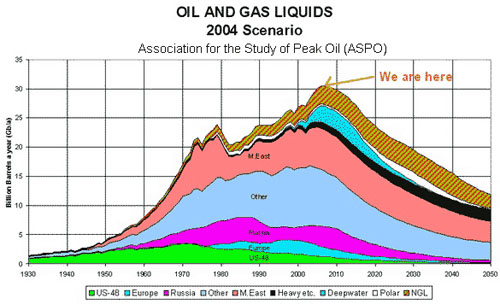
The End of the First Half of the Age of Oil
The bulk of the world’s oil was formed during two extreme periods of global warming some 90 million and 150 million years ago through decomposition and pressurization.
The last three great discoveries of oil were the Alaskan North Slope, in Siberia, and the North Sea, in 1967, 1968, and 1969 respectively. That makes over 40-years of ever increasing oil consumption not backed up by any meaningful new discoveries to replenish dwindling reserves. Today, 58 countries are producing less oil than in the past, and it is not for lack of effort. Even though two-thirds of the world’s remaining oil reserves are to be found in the Middle East, Iran’s oil production peaked in 1978, and there has only been one major new oil field discovered in Saudi Arabia since 1967.
What oil remains will increasingly be sought from unstable states ever more hesitant to part with their oil, states such as Iraq, Iran, Saudi Arabia and Russia. We in America are making ourselves dependent on foreign regimes that often hold very little love for America herself.
Furthermore, the actual reserve figures of oil are the subject of as much massaging as they are speculation.
“The classifications of the reserves depends on the motivations of the person that’s classifying them,” says oilfield technology consultant James Blackwell. His claims are echoed by Michael C. Ruppert, author of “Crossing the Rubicon: America’s Descent into Fascism at the End of the Age of Oil,” who says, “The books on oil have been as cooked as the books at Enron.”
There is in the oil market the incentive to report increased oil reserves in order to increase allowable production quotas. In the 1980s, Kuwait, Venezuela and Saudi Arabia each doubled their projected oil production figures virtually overnight claiming to have discovered new reserves. In many cases reserve estimates publicly divulged by OPEC members are a combination of proven, probable and possible reserves.
“If it turns out that Saudi Arabia’s output has peaked, which is highly likely, then, categorically, the world has peaked,” warns Matthew Simmons, an energy investment banker.
Competition for Resources
The US was, for almost a century, the largest producer of oil until the 1950s, using oil for the production of nearly everything else, including the development of freeway-interconnected suburbs. No one anticipated the end of cheap oil, or that US oil reserves would eventually run dry. Nowadays the US uses 25% of the world’s oil output, despite only having 2% of the world’s reserves. However, the demand for energy is rising faster than expected, and China and India are just getting started. In 2004 alone, China increased its importation of oil by a whopping 25%.
Most urban Chinese believe they will own a car within 5-years, so there is a very real expectation that the demand for oil in China will accelerate demand for dwindling global oil supplies. Are China and India arriving at the oil party when the tank is half empty? James Howard Kunstler, author of, “The Geography of Nowhere: The Rise and Decline of America’s Man-Made Landscape,” voices the tacit fear that, as oil reserves become increasingly scarce, the supply lines of cheap underwear and household appliances from Chinese factories will dry up, and the US could be forced into a protracted conflict with China over securing the last remaining reserves of oil and gas in the Middle East and Central Asia.
Perpetuated Ignorance
“Keeping the world dependent on oil for as long as possible is important,” says Fadhil Chalabi, former acting Secretary General of OPEC and former Iraqi Oil Minister. The problems lie with people’s inculcated assumptions that oil will never run out, further exacerbated by the failure of political leaders and mainstream media to address the issue in the public arena.
“Right now, not just the United States, but the whole world doesn’t have the kind of political leadership that would make us aware of this problem and do something about it,” says David L. Goodstein, Vice Provost and Professor of Physics at California Institute of Technology.
David Fridley, Staff Scientist at Lawrence Berkeley National Laboratory, says, “[Secretary of Energy Stephen Chu] knows all about Peak Oil, but he can’t talk about it. If the government announced that Peak Oil was threatening our economy, Wall Street would crash.”
Richard Heinberg, author of, “The Party’s Over: Oil, War, and the Fate of Industrialized Societies,” claims the media, “Are silent on the subject of energy resource depletion because there’s no up side. It’s in everybody’s interest to maintain the façade that this way of life is normal. Reality is bad for business. What’s good for business is the fantasy.”
Thus the average American remains blissfully unaware (whilst filling up his or her SUV with ridiculously cheap gasoline in order to drive half a mile to the supermarket where every single item is packaged in plastic made from oil, where the fresh produce is grown using fertilizers made from natural gas, and sprayed with pesticide made from petroleum) that anything is wrong. Currently, says Professor Goodstein, “We pay more for bottled drinking water. Gasoline is just about the cheapest liquid you can buy in the US, and as long as that’s true, Americans are not going to be concerned.”
So we are left with two choices: either get the population to understand that if they want to keep consuming oil at this rate, they will continue to live in a world of resource wars (see Dick Cheney’s assertion that the current wars will “not end in our lifetime”), or begin to prepare for the end of cheap oil and invest in alternative energies and localized food producing enonomies.
Oil has given us a way of accelerating our depletion of the world’s natural resources at a phenomenal rate. We need to address this issue in concert with Peak Oil. Merely replacing one energy source with another will not check the current trend of mass overproduction that is threatening to permanently damage our planet. Conservation is key to our survival.
The Bloodstream of the Economy
Our whole financial (not to mention transport, energy, manufacturing, etc) system is based on the supply of cheap oil. Population levels since the 1800s and the discovery of black gold have increased 6 times to over 6.4 billion. What will the loss of cheap oil mean in terms of supporting current population levels, or indeed the lifestyle that many in the West enjoy? And how will it impact different population centers such as cities, suburbs, and rural areas? Who will be able to afford to drive, mechanically farm, or produce goods once the price of oil skyrockets?
Two documentaries that speak volumes on this subject are “A Crude Awakening: The Oil Crash”, by Basil Gelpke and Ray McCormack, and, “The End of Suburbia: Oil Depletion and the Collapse of the American Dream.” The latter delves into the impacts on a more local scale, and hence brings us to how the global oil crisis is going to directly affect San Francisco and the greater Bay Area.
The End of Suburbia
In the 1930s, GM, Firestone Tires and Standard Oil were convicted of conspiring to destroy the country’s light rail systems. They bought them up and tore them up, ensuring that people would be reliant on cars, tires and oil. So the impact of Peak Oil on transportation will be catastrophic. This will have a knock-on effect on suburban living, with people reliant on personal automobiles for work and food hit hardest. The Suburban American Dream, the post-war false promise, the “cartoon of country living that has none of the amenities of country life and none of the town, but has all the disadvantages of both,” according to Kunstler, will cease to be viable.
Combine this with Rosenmeier’s assertion in the Peak Oil Preparedness Report that the “potential for people being forced out of San Francisco for economic reasons will accelerate,” and you are left with a trend of people fleeing not just the city, but the suburbs as well. And it is highly unlikely that people will surrender their present way of life without a fight for survival.
Steve Andrews, energy consultant of the Association of the Study of Peak Oil (ASPO), argues that, “Those who have been born in or moved to suburbia tend to feel there is a birthright to the lifestyle they enjoy. Consumption of resources is just something you take for granted and you pay a bill for monthly. That will change and it will be a jarring change when it happens.”
Kunstler goes one step further suggesting there will be a tremendous struggle to maintain the “entitlements of suburbia.”
“Americans will elect maniacs who promise to allow them to keep their McMansions and their commutes and that’s going to produce a lot of political friction, probably a lot of violence, probably a threat to our democratic institutions,” Kunstler warns.
The Edge of the World
California, and therefore San Francisco, is a long way from the rest of the world. It is even a long way from most of America. The majority of people that come to this fair city, or its even more vulnerable cousin further south, do so by air or automobile. In fact, 18% of jobs in San Francisco are dependent on visitors. If tourism declines due to the end of mass air travel and road transport, San Francisco will undoubtedly suffer. The Peak Oil Preparedness Task Force Report predicts City revenues will go down just when we need more income, “Between the struggling economy, rising food prices, the increasing cost of transportation, and the growing number of people needing assistance, the strain on the City budget will intensify just at the moment when City revenues will be adversely affected by the bad economy.”
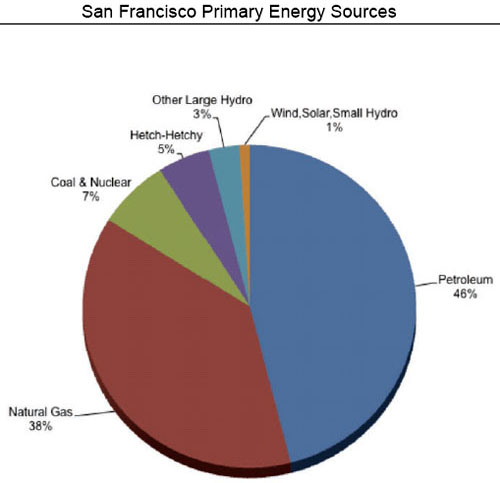
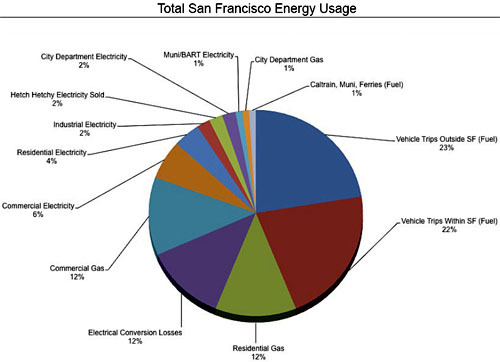
Road Transport
Peak Oil Task Force member Ben Lowe stated that though San Francisco was better placed than most American cities to deal with Peak Oil, there would still be serious issues to address. 44% of all trips made in San Francisco and 80-90% of trips made outside of the City involve the use of a car. The popular suggestion of switching to electric cars was shot down by the revelation that, if all cars were magically converted to electric power overnight, during peak hours the California grid would only be able to recharge 15% of them.
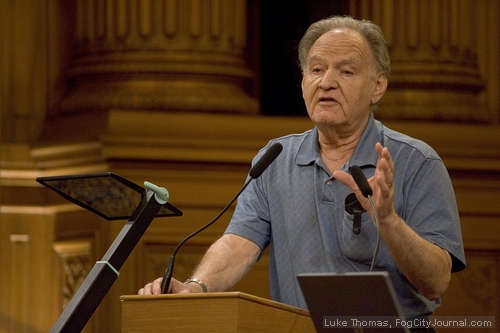
Peak Oil Preparedness Task Force member Ben Lowe.
Although San Francisco takes the lead in many energy and planning issues, the proposed California High Speed Rail will take 15 years to complete, and this and other transport solutions take many years to plan, to find agreement and funding, and to build. Lowe stressed that there is no “magic bullet,” but rather hundreds of small solutions will be needed to help to reduce oil consumption. Nevertheless, there will be “great economic decline locally,” once we start to use alternative energies, and we would need to start looking for other sources of funding for the overstretched MUNI network. 2009 has seen a 2% rise in transit ridership, an increase considered unusual during a downturned economy.
Mass Transit and the Community
BART Board Director Tom Radulovich testified with the sobering claim, “We are currently planning for an untenable future,” and that we need, “solutions that are resilient for a number of different futures.” In other words, he said, we need to prepare for many different eventualities and have flexible plans that can be adjusted to respond to changing circumstances.
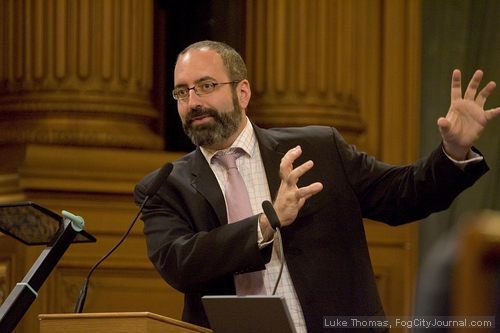
BART Director Tom Radulovich
According to Radulovich, $6.4 billion has been earmarked for expanding and maintaining freeways in California. It would be futile to pump more money into freeways if no one will be using them in twenty years, he said. This falls in line with Kunstler’s assertion that, “We are going to have to downsize: the age of the 3000-mile Caesar Salad is coming to an end. The cost of maintaining the freeways to a high level, so that trucks don’t break their axels transporting Caesar Salads from the Central Valley in California to Toronto, will become unmanageable. This is when certain trade relationships will start to break down.”
Instead, Radulovich, who is also the Executive Director of Livable City, called for localized neighborhoods and communities where people can walk or bicycle rather than drive, mass employment relocation centred around transit hubs, and a more robust mass-transit system for a more fuel-efficient future. He also pointed out, disturbingly, that in the US we spend as much money on parking every year as we do on national defence. Furthermore, not only are half of BART’s future needs unfunded, he said, but BART needs to be more efficient in terms of having full trains going in both directions, 24/7. Radulovich added, “If we do everything in this report, we are going to be a happier city.”
Small Solutions
District 10 candidate Eric Smith, representing the Biodiesel Task Force and Railroads, called for a multi-faceted approach, making use of energy from biofuels. At the moment, we have different renewable energy projects vying against each other for the same small resources, he said. Eric Brooks, of the SF Green Party, emphasized the failings of electric automobiles and contended that the production of biofuels actually caused more damage to the environment and would negatively impact climate change.
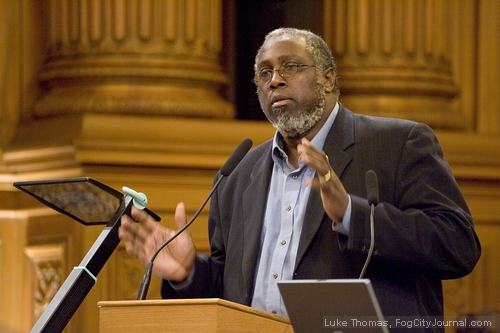
Eric Smith
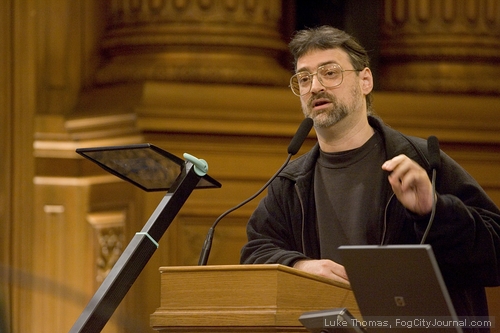
Eric Brooks
However, Denise Yatta, a former employee of the City, complained that in spite of many energy and money-saving schemes she has suggested over the years, bosses and CEOs just don’t care when, for example, it is suggested they turn off their building lights at night.
Perhaps one could take a leaf out of the book of Adam Greenfield, whose project, The Gubbins Experiment, has him trying to avoid using car for travel for the whole of this year. He also mentioned the Transition Movement, an initiative that focuses on the resiliency of the community, its ability to withstand shocks, and aims for permaculture. The idea, he says, is to work alongside governments, but ultimately prepare for a time when governments may cease to function effectively.
“The government doesn’t have what it takes to respond quickly enough. It has to come from the grass roots,” Greenfield said.
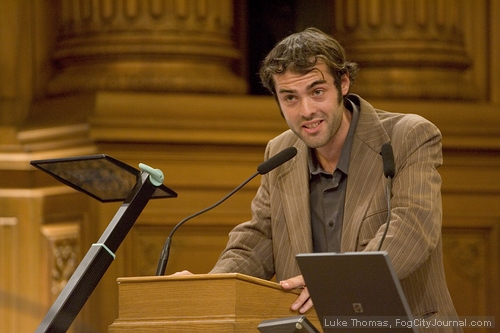
Adam Greenfield.
In response to questions as to whether this report might be filed and forgotten, along with many other government initiatives, Mirkarimi said that he saw “this report as a watershed and didn’t create this to see it collect dust.” However, he also stressed that it was still an unfunded initiative, though the ultimate goal would be to write something to its effect into the City Charter. Supervisor Eric Mar put forward the suggestion that this information needed to be widely circulated, perhaps “in a simple handout that an eighth-grader could understand.”
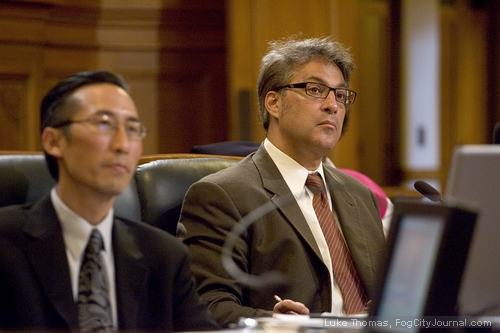
Supervisors Eric Mar and Ross Mirkarimi.
Whatever the fate of this report, let its contents and warnings be understood and heeded not just by residents of San Francisco. It is only through mass education that we can collectively do something about our impending oil shortage.
“If a path to the better there be, it begins with a full look at the worst.”
– Thomas Hardy, 1887
Luke Thomas contributed to this report.


 The Hunger Site
The Hunger Site
September 30, 2009 at 7:23 am
The “forest” you refer to here is social collapse as a result of peak oil? It’s not happening.
September 29, 2009 at 1:55 pm
Rob, I understand that District 5 isn’t as tree-heavy as other neighborhoods, so to gaze upon the trees is a lovely passtime… but just this once, please try to recognize the forest.
September 29, 2009 at 9:20 am
Peak “demand” is an important part of the equation. Many countries began reducing their use of oil more than ten years ago.
http://peakoildebunked.blogspot.com/search?q=peak+demand+in+Sweden
My point isn’t that oil isn’t a finite resource, but that our transition to using a lot less oil is going to be a lot smoother than doomers like Kunstler think, which will no doubt be disappointing to the bike people, who were looking forward to social collapse that would force people to take up cycling.
September 29, 2009 at 8:40 am
Rob, your anti-bicyclist crusading head is in the sand. Oil demand has temporarily receded because the world is in economic recession.
September 29, 2009 at 8:09 am
“…never ending resource wars, increased political instability, economic collapse and social upheaval…”?
On the other hand, doomers like Jim Kunstler have been predicting social collapse for years, and they have been wrong (a few years ago, Kunstler predicted the Dow Jones average was going down to 4,000!). Consider too that oil demand is already going down in many countries:
http://peakoildebunked.blogspot.com/search?q=peak+demand
All the gloom and doom from the left is more wishful thinking than reality-based analysis.